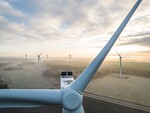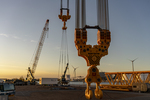05/12/2007
Germany - Who owns the wind?
As Europe's greenest country builds ever more electricity-producing wind farms, so the rights to nature are now being fought over by lawyers. Among the cases being considered by a Leipzig court is a dispute between the operators of two wind turbine facilities. At issue: who owns the wind?
"It is becoming an issue that will keep lawyers in work for many years to come as the complexity of the law combined with planning regulations provides scope for many battles in the future," said legal expert Juergen Linden.
In Leipzig, the legal battle centres on a wind farm in Deliztsch, in the eastern German state of Saxony, and a businessman who wants to set up a bigger wind farm in the vicinity. The current operator claims siting another turbine nearby will create a slipstream, decreasing the speed of the airflow and therefore hitting the productivity - and of course the profits - of his electricity-producing windmill.
"This wind theft naturally affects profits," Leipzig lawyer Martin Maslaton said, justifying his client's complaint. He said his client believed he could lose more than 15 per cent in income over the lifespan of the wind farm - a loss of several hundred thousand euros. With single wind turbines now routinely capable of three megawatts of output - enough to power 3000 homes per turbine - wind power has become too cheap and too practical to ignore.
No country appears more determined to realise the potential of wind energy than Germany. With virtually no energy resources other than coal, and a commitment to phase out nuclear power over the next two decades, Germany is likely to extend its lead in wind power. And in legal squabbling.
"It is becoming an issue that will keep lawyers in work for many years to come as the complexity of the law combined with planning regulations provides scope for many battles in the future," said legal expert Juergen Linden.
In Leipzig, the legal battle centres on a wind farm in Deliztsch, in the eastern German state of Saxony, and a businessman who wants to set up a bigger wind farm in the vicinity. The current operator claims siting another turbine nearby will create a slipstream, decreasing the speed of the airflow and therefore hitting the productivity - and of course the profits - of his electricity-producing windmill.
"This wind theft naturally affects profits," Leipzig lawyer Martin Maslaton said, justifying his client's complaint. He said his client believed he could lose more than 15 per cent in income over the lifespan of the wind farm - a loss of several hundred thousand euros. With single wind turbines now routinely capable of three megawatts of output - enough to power 3000 homes per turbine - wind power has become too cheap and too practical to ignore.
No country appears more determined to realise the potential of wind energy than Germany. With virtually no energy resources other than coal, and a commitment to phase out nuclear power over the next two decades, Germany is likely to extend its lead in wind power. And in legal squabbling.
- Source:
- Online editorial www.windfair.net
- Author:
- Posted by Trevor Sievert, Online Editorial Journalist
- Email:
- press@windfair.net
- Link:
- www.windfair.net/...
- Keywords:
- Germany, wind energy, renewable energy, wind turbine, wind power, wind farm, rotorblade, onshore, offshore


























